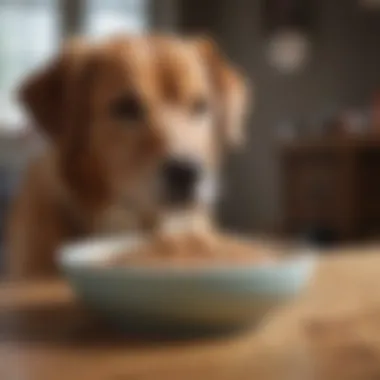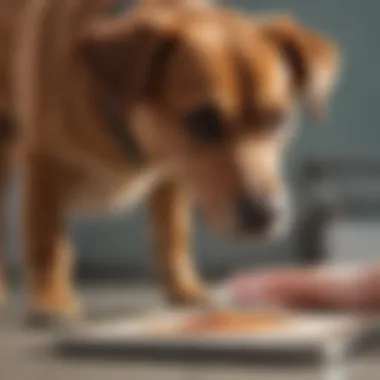Essential Guidelines for Feeding a Dog with Diarrhea


Intro
Diarrhea in dogs can be distressing for both pets and their owners. This condition can stem from various causes, including dietary indiscretions, infections, or underlying health issues. Providing the right diet during such times is crucial to help your dog recover while maintaining hydration and comfort. Understanding how to approach feeding your dog with diarrhea is essential for effective management.
Understanding Your Pet
Breed Traits
Different breeds may react uniquely to dietary changes and gastrointestinal upset. For example, small breeds may have a heightened sensitivity to certain foods or stress, leading to diarrhea. Conversely, larger breeds might display robust gastrointestinal resilience but still require careful nutritional oversight. Knowing the traits of your specific breed can inform how you tailor dietary approaches during illness.
Common Temperaments
Temperament also plays a role in how dogs respond to illness. Some dogs may become anxious or withdrawn, while others display more aggression or hyperactivity. Recognizing these behaviors can help owners provide better support during recovery by creating a calming environment or engaging in soothing activities.
Special Needs
Dogs with specific health concerns, such as pancreatitis or food allergies, may need closer attention. If your dog has a pre-existing condition, consulting a veterinarian is wise before making dietary changes. Tailoring your dog's diet to accommodate special needs will likely yield a greater chance of recovery.
Nutrition and Feeding Guidelines
In the immediate aftermath of diarrhea, adjusting your dog's diet is a critical step. Providing a bland diet is often recommended. This may include:
- Boiled chicken (no skin or bones)
- White rice or plain boiled potatoes
- Canned pumpkin for fiber (unsweetened)
- Plain yogurt for probiotics, if tolerated
Changing the food slowly over several days is important. Introduce any new food gradually, mixing it with the bland diet to ensure acceptance and minimize digestive upset.
Hydration
Maintaining hydration is paramount. Dogs with diarrhea can become dehydrated quickly. Ensure that your dog has access to fresh water at all times. In some cases, electrolyte solutions designed specifically for pets may be beneficial. Consult your vet about this option.
When to Seek Veterinary Help
Occasionally, diarrhea might indicate deeper health issues. Pet owners should look for signs such as:
- Persistent diarrhea lasting more than 24 hours
- Blood in stool or severe vomiting
- Lethargy or lack of appetite
- Abdominal pain or bloating
When in doubt, contact your veterinarian. A professional assessment may be necessary to prevent serious complications.
It is better to err on the side of caution.
By recognizing the signs of distress in your pet, owners can act promptly to ensure the well-being of their dog.
Epilogue
Feeding a dog with diarrhea requires careful consideration of their diet and behavior. By understanding the specific needs and traits of your pet, you can create a supportive environment for recovery. Monitor your dog's condition closely and consult a veterinarian if signs of distress persist. This disciplined approach will enhance the chances of recuperating a healthy and happy dog.
Understanding Diarrhea in Dogs
Diarrhea in dogs is a common yet concerning issue that pet owners may face. Understanding this condition is essential as it can help in effectively managing your dog's health. This section outlines the definition, symptoms, common causes, and potential complications associated with diarrhea in dogs. Gaining knowledge in these areas ensures that you can respond promptly and appropriately if your dog experiences gastrointestinal disturbances.
Definition and Symptoms
Diarrhea refers to loose or watery stools that occur more frequently than usual. It can be acute, lasting less than two weeks, or chronic, persisting for longer periods. Recognizing the symptoms is critical. In addition to abnormal stool consistency, dogs may exhibit signs of discomfort, including:
- Increased urgency to defecate
- Straining while trying to pass stool
- Abdominal bloating or pain
- Lethargy
- Changes in appetite
- Vomiting, in some cases
Being alert to these symptoms can help in assessing the severity of the situation and prompt timely intervention if needed.
Common Causes of Diarrhea
There are numerous factors that can lead to diarrhea in dogs. Some common causes include:


- Dietary indiscretion: This often occurs when dogs eat something they should not, like spoiled food or garbage.
- Infections: Bacterial, viral, or parasitic infections can disrupt normal digestion.
- Food intolerances or allergies: Some dogs may react negatively to certain ingredients in their diet.
- Stress: Changes in the environment or routine can also lead to gastrointestinal upset.
- Underlying health issues: Conditions such as pancreatitis or inflammatory bowel disease may present as diarrhea.
Awareness of these causes gives you a better understanding of potential triggers for your dog's diarrhea, allowing you to mitigate risks effectively.
Potential Complications
While diarrhea itself may seem mild, it can lead to serious complications if not addressed. Key complications include:
- Dehydration: This can occur rapidly in dogs, especially if vomiting accompanies diarrhea. Monitor hydration levels closely, as severe dehydration may require veterinary intervention.
- Electrolyte imbalances: Loss of fluids can result in a dangerous imbalance of electrolytes in your dog’s body, affecting organ function.
- Long-term health issues: Prolonged diarrhea may signal an underlying condition that needs correction. Ignoring such signs can lead to further health complications.
It's crucial to observe your dog's condition closely. If diarrhea persists for more than 24 hours, you should consult a veterinarian to avoid complications.
Initial Steps When a Dog Has Diarrhea
When a dog experiences diarrhea, it is vital to take quick and appropriate steps. This section discusses how to approach this condition effectively. Taking the right actions initially helps in rooting out the cause, aiding recovery, and ensuring your pet remains comfortable. Prompt assessment and support can prevent further complications.
Assessing Severity
The first step in addressing diarrhea is to assess its severity. This helps determine if at-home care is adequate or if veterinary attention is needed. Key factors to observe include:
- Frequency of diarrhea: Multiple episodes in a short period can indicate a more significant issue.
- Consistency of stool: Watery or loose stools are more concerning than soft stools.
- Presence of blood: Any signs of blood in the stool require immediate veterinary attention.
- Accompanying symptoms: Vomiting, lethargy, or abdominal pain could signify a more serious condition.
If your dog exhibits mild diarrhea without additional concerning symptoms, monitoring at home may be sufficient. However, if diarrhea persists for more than 24 hours or worsens, professional guidance is essential.
Hydration Considerations
Diarrhea often leads to rapid fluid loss in dogs, which can result in dehydration. This risk is especially pronounced in young or older dogs. Ensuring your dog stays hydrated is a priority during this time. Consider these hydration measures:
- Water Access: Always provide fresh water to your dog. Monitor their drinking habits closely.
- Electrolyte Solutions: You might consider a dog-specific electrolyte solution to help replenish lost minerals.
- Small, Frequent Sips: Encourage your dog to take small sips frequently rather than large amounts at once.
Signs of dehydration may include dry gums, excessive lethargy, or loss of skin elasticity. If you suspect dehydration, consult your veterinarian. Their expertise is crucial in this phase. Proper hydration support can significantly aid your dog’s recovery during this challenging time.
It is essential to act promptly and keep a close eye on your dog’s condition. Small changes in behavior can indicate a need for more intensive care.
Following these initial steps can guide pet owners towards making informed decisions tailored to their dog's needs during distressing episodes of diarrhea.
Dietary Adjustments for Dogs with Diarrhea
When a dog experiences diarrhea, dietary adjustments become crucial in managing the condition. Selecting the right foods can effectively restore normal digestive function. This not only alleviates immediate symptoms but also supports long-term health. Consideration of specific factors in the dog's diet can yield substantial benefits. These adjustments foster optimal gastrointestinal recovery and help re-establish the digestive balance.
Importance of an Elimination Diet
Implementing an elimination diet involves removing potential irritants from the dog's nutrition. The goal is to identify and eliminate foods that trigger gastrointestinal upset. Through this approach, pet owners can isolate specific allergens or intolerances.
An elimination diet often starts with simple, bland foods. These foods are less likely to irritate the digestive tract. Common options include boiled chicken and rice, which are easily digestible. Keeping the diet limited helps in identifying food triggers since the range of ingredients is restricted. As the recovery progresses, pet owners can gradually reintroduce other foods, one at a time. This process will help pinpoint harmful ingredients without overwhelming the system.
An elimination diet is essential for diagnosing potential food sensitivities in dogs.
Recommended Feeding Frequency
Adjusting the feeding frequency during diarrhea is an essential consideration. It's often advisable to provide smaller meals more frequently rather than a few large portions. Feeding a dog multiple small meals throughout the day can ease strain on the digestive system. This helps manage diarrhea more effectively, making it a beneficial strategy during a gastrointestinal upset.
Dividing the food into smaller portions also helps in maintaining hydration. Since dogs with diarrhea can dehydrate quickly, a steady intake of easily digestible food can complement fluid intake. Pet owners should monitor their dog's response to these changes closely. This allows for quick adjustments as necessary to continue supporting digestive health.
Ensuring the dog's comfort and health during this period is the primary objective. Success relies on careful management of food intake and observance of the dog's state throughout recovery.
Suitable Foods for Dogs with Diarrhea
When a dog experiences diarrhea, selecting suitable foods becomes critical to facilitate recovery. Proper dietary choices can help stabilize the dog's gastrointestinal tract and promote healing. Foods that are gentle on the digestive system aid in minimizing irritation and restoring normal bowel function. Understanding which foods to include and which to avoid can make a notable difference in the recovery process.
Bland Food Options


Boiled Chicken and Rice
Boiled chicken and rice is a widely recommended meal for dogs suffering from diarrhea. This dish is easily digestible and does not overwhelm the stomach. The primary component, chicken, provides high-quality protein without excess fat. The rice serves as a carbohydrate source that is gentle on the gut. This combination helps to firm up stools and can prevent further gastrointestinal distress.
Key characteristic: The simplicity of boiled chicken and rice makes it a staple in canine diets during digestive upsets. Its blandness does not cause irritation, which is significant for a dog that may already be feeling unwell.
Unique feature: This meal is not only nutritious but also easy to prepare. Cooking the chicken thoroughly and boiling the rice yields a soft texture, which is especially suitable for dogs experiencing discomfort from diarrhea.
Advantages: This food choice is affordable and easy to obtain, making it a practical option for pet owners.
Plain Pumpkin
Plain pumpkin is another excellent option for dogs dealing with diarrhea. It is rich in soluble fiber, which helps to absorb excess water in the stool and promotes firm bowel movements. Pumpkin also contains essential vitamins and minerals that can assist in overall health, particularly in the digestive system.
Key characteristic: The high fiber content in pumpkin allows it to act as both a bulk-forming agent and a stool softener, depending on the dog's needs. This adaptability is beneficial when trying to manage diarrhea.
Unique feature: When administering plain pumpkin, ensure it is unsweetened and free from spices or additives. Pure pumpkin puree or cooked pumpkin is best.
Advantages: It is a widely available and natural food option that ensures dogs receive beneficial nutrients while aiding digestion.
Plain Yogurt
Plain yogurt can be a valuable addition to a dog's diet during episodes of diarrhea. It is a good source of probiotics, which are beneficial bacteria that help regulate gut flora. By restoring the balance in the intestines, yogurt plays a crucial role in aiding digestion and recovering from gastrointestinal disturbances.
Key characteristic: The live cultures present in plain yogurt can help combat harmful bacteria in the gut that may be contributing to diarrhea.
Unique feature: It is essential to choose unsweetened, plain varieties that do not contain artificial sweeteners, like xylitol, which are toxic to dogs.
Advantages: Yogurt can be a tasty treat, encouraging a dog to eat even when their appetite may be suppressed.
Commercial Diets for Gastrointestinal Upsets
In addition to home-cooked meals, there are several commercially available diets designed specifically for dogs experiencing gastrointestinal upsets. These products often contain highly digestible ingredients and are formulated to provide optimal nutrition during recovery.
Commercial diets can help ensure that dogs receive necessary nutrients without the burden of challenging digestion. Options are available from well-known brands with veterinary recommendations.
Factors to consider when selecting a commercial diet include:
- Digestibility: Choose products that highlight easily digestible proteins and carbohydrates.
- Nutritional profile: Ensure the chosen food provides a balance of essential nutrients without undue fats.
- Veterinary guidance: Consulting with a veterinarian before switching to a commercial diet can provide specific recommendations tailored to an individual dog's needs.
Foods to Avoid
Understanding which foods to avoid is crucial for any dog owner dealing with a pet suffering from diarrhea. Certain foods can exacerbate gastrointestinal upset and prolong recovery. When a dog has diarrhea, it’s essential to provide a diet that supports healing. Avoiding specific types of food helps ensure that the digestive system can recover without the added stress of irritants.
Rich and Fatty Foods
Rich and fatty foods should be a significant concern when a dog is experiencing diarrhea. These foods can lead to further digestive issues, which might intensify the current symptoms. High-fat meals are harder for the digestive system to process, especially when it’s already compromised by diarrhea. This can lead to increased irritation and may even result in a condition known as pancreatitis, especially in dogs predisposed to such health concerns.
Some specific foods to steer clear of include fatty cuts of meat, fried foods, and anything rich in cream or butter. These items may tempt your dog, but resist the urge to give in. It is better to prioritize their recovery over temporary satisfaction.
Human Foods that are Harmful
In addition to avoiding rich and fatty foods, certain human foods are outright harmful to dogs, especially during digestive distress. Items such as chocolate, grapes, and onions can pose serious health risks. Even foods that seem harmless, like garlic or avocados, can disrupt a dog's gastrointestinal system and exacerbate diarrhea.
Here are some key human foods to avoid:
- Chocolate: Contains theobromine which is toxic to dogs.
- Grapes and Raisins: Can cause kidney failure.
- Onions and Garlic: Can lead to anemia.
Being aware of these foods is essential. Keeping your dog away from them will minimize risks and support their recovery process. Monitoring what your dog consumes will pay off in the long run, helping maintain their overall health post-diarrhea.
Always consult with your veterinarian if you have questions about specific foods or your dog's reaction to certain items.


Adhering to a careful diet that excludes these harmful substances reinforces the importance of thoughtful feeding habits during recovery. Proper nutrition and diligence in avoiding harmful foods will help restore your dog's digestive health.
Monitoring Recovery
Monitoring recovery in dogs suffering from diarrhea is essential for ensuring their well-being. As a pet owner, knowing how to assess your dog's progress can make a difference in managing their health effectively. The monitoring process consists of observing dietary responses and gradually reintroducing regular foods. Both elements contribute to recovery and help avoid setbacks.
Tracking Dietary Response
Tracking your dog's dietary response involves closely observing how they react to changes in their food. After the initial bland diet, it is vital to keep an eye on the following aspects:
- Stool Consistency: Monitor the stool's firmness daily. Improvement from watery to semi-solid or solid stool indicates progress.
- Frequency of Bowel Movements: Note any changes in how often your dog needs to go outside. A decrease in frequency is often a positive sign.
- Appetite Levels: Assess your dog's interest in food. A returning appetite can indicate recovery.
- Behavioral Changes: Look for signs of vitality, such as increased playfulness or energy.
These parameters validate how well the dog is responding to dietary adjustments. If improvements are not evident within a day or two, reconsider the current dietary plan and consult your veterinarian if necessary. Keeping a written log may make it less challenging to track these changes over time.
Reintroducing Regular Food
Once your dog shows consistent improvement in their stool quality and overall health, it's time to reintroduce regular food. This step should be executed gradually to ensure that the dog's digestive system can adapt without being overwhelmed.
- Start Slowly: Begin with small amounts of the regular food mixed with the bland diet. Gradually increase the regular food portion while decreasing the bland diet over a period of several days.
- Watch for Reactions: Observe any adverse reactions each time you increase the regular food ratio. If diarrhea returns, revert to previous steps and consult your vet.
- Select a High-Quality Diet: Choose a balanced, easily digestible food for reintroduction. Quality nutrition supports digestive recovery.
- Patience is Key: The timeline can vary for each dog. Some may transition back to regular food within a week, while others may need more time.
Reintroducing regular food carefully will help ensure that your dog's digestive health stabilizes without causing further discomfort. Remember, monitoring during this transition is just as critical as the initial phase of recovery.
When to Seek Veterinary Care
Understanding when to seek veterinary care for your dog experiencing diarrhea is crucial for effective management. Diarrhea can be a symptom of various underlying health issues, some of which may require immediate attention. Owners should remain vigilant and proactive, recognizing that while many cases resolve with home treatment, certain conditions demand professional intervention.
Persistent Symptoms
When a dog shows persistent symptoms like prolonged diarrhea that lasts more than 24 hours, it raises alarms. Continuous diarrhea can indicate serious health problems requiring veterinary evaluation. It is necessary to monitor any accompanying indicators like vomiting, lethargy, or lack of appetite. If your dog exhibits these symptoms, it is wise to consult a veterinarian sooner rather than later.
Some key points to consider include:
- Duration and frequency of diarrhea.
- Presence of any additional symptoms (like vomiting or blood).
- Age and overall health of the dog.
- Previous medical history that may play a role in current conditions.
The decision to see the vet should be based on a combination of these factors. Taking action promptly can mitigate further complications.
Signs of Dehydration
Dehydration is a serious consequence of diarrhea. It can develop rapidly in dogs due to loss of fluids and electrolytes. Therefore, observing signs of dehydration is essential. Common signs include:
- Dry or sticky gums.
- Excessive thirst or lack of interest in water.
- Loss of skin elasticity.
- Sunken eyes.
- Weakness or lethargy.
If you notice any of these signs, it signals the necessity for immediate veterinary care. Even mild dehydration can quickly escalate into a severe condition, especially in smaller breeds or young puppies. The veterinarian can evaluate the severity of dehydration and may initiate treatments, which can include intravenous fluids or electrolyte supplementation.
**Timely intervention can be a factor in preventing serious complications **
In summary, understanding when to seek veterinary care is essential in managing your dog's health during episodes of diarrhea. Monitoring persistent symptoms and recognizing signs of dehydration can guide your decisions and safeguard your dog's well-being.
Maintaining Ongoing Digestive Health
Maintaining ongoing digestive health is crucial for dogs, especially those who have experienced diarrhea. A healthy digestive system ensures that nutrients are absorbed efficiently, which is vital for a dog's overall well-being. Dogs can be prone to a variety of gastrointestinal issues, and persistent problems may lead to more severe health concerns. By focusing on digestive health, pet owners can help prevent recurrent episodes of diarrhea and promote a long life for their pets.
Ensuring Quality Nutrition
Quality nutrition plays a central role in supporting a dog's digestive health. It is essential to provide a balanced diet that includes all necessary nutrients. Some key considerations include:
- High-quality ingredients: Look for dog food that uses real meat, vegetables, and grains. Avoid fillers and artificial preservatives.
- Diet tailored to the dog's needs: Puppies, adults, and seniors have different nutritional requirements. Select appropriate food based on the dog's age, weight, and lifestyle.
- Probiotics: Adding probiotics can help promote a healthy gut flora. This may reduce the risk of diarrhea and other gastrointestinal issues.
It is also important to monitor any changes in your dog's bowel movements. This can offer clues about their dietary tolerance and help identify potential food sensitivities.
Regular Vet Check-ups
Regular veterinary check-ups are vital for maintaining a dog's digestive health. These visits can help detect underlying health issues before they become serious. Some of the significant aspects of vet check-ups include:
- Routine examinations: Regular check-ups can identify early signs of digestive disorders. This may include blood tests and stool analysis.
- Vaccinations and preventive care: Keeping vaccinations up to date and discussing preventative care can protect dogs from various diseases that may affect their digestive systems.
- Advice on diet: Vets can provide personalized recommendations based on a dog’s health needs. They can suggest specific foods or supplements to enhance digestion and overall health.
It is important to understand that ongoing attention to a dog's health is necessary even after recovery from diarrhea. Regular vet visits can help ensure that your dog stays healthy and happy.
By prioritizing quality nutrition and making sure that regular vet check-ups are part of the routine, pet owners can significantly improve their dog's digestive health. This approach can prevent future problems and create a solid foundation for a healthy life.



